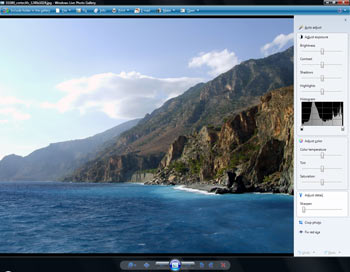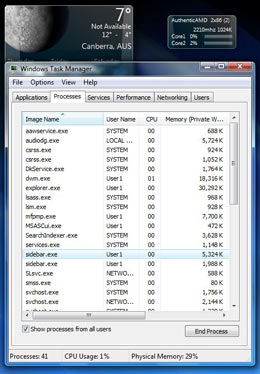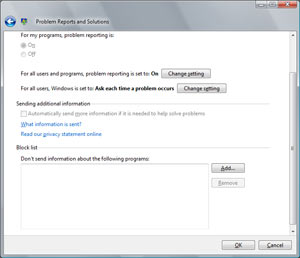Vista Annoyances Resolved
[Page 6] Annoyances & Solutions (Pt.3)
7. Windows Photo Gallery Freezes
One legitimate problem which seems to affect some Vista users is the periodic freezing or unresponsiveness of the Windows Photo Gallery, the default image viewer in Vista. As an image viewer, the Photo Gallery is actually quite good, with handy additional features over its XP counterpart including being able to change the brightness or remove red eye, and then in the future completely undo all of these changes if you so wish.
To start with I recommend you install the Windows Live Photo Gallery, which is an enhanced version of Vista's Photo Gallery. It looks and works in much the same way, and integrates seamlessly into Vista, however it has more image editing features for one - see the screenshot above.
Still, both the default Windows Photo Gallery and the improved Windows Live Photo Gallery seem to suffer from periodic freezing and unresponsiveness issues on some systems.
Solution
One solution to this problem is covered in this Microsoft Article, however it doesn't resolve this issue in many cases. I believe I've found the root cause of this strange behavior: it appears that some sort of conflict can occur if the Search Indexer is attempting to access an image while you view it in Photo Gallery. This occurs if the image has changed in some way, such as being edited by the user, or is new to the drive, such as having been recently downloaded or added to an indexed folder. For example you may be browsing through images you just downloaded to the \Downloads folder at the same time as the Indexer is accessing them, which results in periods of unresponsiveness at times.
The solution is more of a workaround, but is relatively straightforward - make sure to remove folders from the Search Indexer where you would normally add lots of new images or where you edit them using the Fix feature in Photo Gallery - see the 'Constant Hard Drive Activity' annoyance on the previous page see how to customize the Search Indexer. For example you can remove the \Downloads folder from the Indexer, and then whenever you want to edit any images using the Photo Gallery, copy them into that folder and once done editing and viewing the changed images, copy them back into the appropriate folder, such as \Pictures. Remember, viewing images in folders where the image hasn't changed shouldn't cause any problem in Photo Gallery; it's only when an image is new or has changed that the indexing conflict seems to occur and result in this problem.
8. Vista's Eye Candy is a Performance Drain
Vista's pleasantly improved graphical user interface is often cited as a source of annoyance for Vista detractors who accuse it of being a performance drain, part of Vista's "bloat". Fortunately this is not true; one of the many benefits of Vista is that the desktop effects are disabled the moment a fullscreen application is launched. So whenever you launch a game for example, Vista disables Aero, removes the Sidebar gadgets and stops things like DreamScene animated desktop wallpapers. That way you can have the best of both worlds - you can enjoy a full-featured and graphically rich desktop, and run your games and other programs at full speed as well. You don't need to strip back your desktop to being a barren and boring place just so you can supposedly gain performance.
Ironically, as examined in this article, virtually every version of Windows has been criticized for being 'bloated', even the darling of the minimalist set, Windows 2000. It simply seems that because Vista's graphical changes are the most obvious feature difference between it and Windows XP, it gets more of the attention from those who know no better, screaming "All those graphics are stealing my megahurtz!".
Solution
There's no real reason to strip back the visual appeal of your desktop or disable desirable effects unless you have a very low-end graphics card and/or you notice your desktop is not fully responsive. It's true that some components, such as Sidebar Gadgets, can add to overall memory usage to varying degrees. On my system for example I have a floating Weather gadget and custom dual core CPU Meter gadget which combined take up roughly 7MB of memory when active - see the screenshot above for proof: in Task Manager with the processes sorted alphabetically, you can see that the two sidebar.exe processes add up to 7312 KB (7MB). Even with only 2GB of RAM I don't consider this an issue, however obviously it is recommended that you don't go overboard and cover your desktop with dozens of sidebar gadgets unless you've got the RAM to spare. The rest of the desktop effects such as Aero Glass and its transparency level, animated and fading transitions, etc. can all be adjusted under Control Panel>Personalization and Control Panel>System>Advanced>Performance Settings. For the most part even older systems can enable full graphical effects without noticing any slowdowns - my parent's PC for example has a Radeon 9800 Pro circa 2003, along with a single core Pentium 4 2.66GHz CPU and 2GB of RAM, and it has all Vista graphical effects enabled and running without a hitch.
In short you don't need to turn your Vista desktop into a Windows 98 clone in the misdirected hope that this will make your system faster in games. The Graphics & Interface chapter of the TGTC has more information combined with a wide range of customization and optimization tips and tricks worth reading.
9. Vista Is Loaded With DRM
A topic on which there is great ignorance in general is Digital Rights Management (DRM) and copy protection. Suffice it to say that a scare tactic often employed to make Vista appear to be a major draconian step backward is to imply that Vista is absolutely loaded with DRM designed to spy on and constrict the average user. While the issue of DRM and piracy are far too involved to discuss in this article, I would encourage you to read more about these topics from a range of more reliable sources than just sensationalist blogs and piracy advocates.
In terms of Vista's protection mechanisms, for starters its Activation procedures and requirements are much the same as that of Windows XP. If you do happen to fail Activation for whatever reason, as of SP1, Vista no longer goes into 'Reduced Functionality' mode - instead it just shows a prompt requesting Activation at each logon; it places a 'This copy of Vista is not genuine' stamp on the corner of the screen; and it reverts your wallpaper to a black background every hour. So even if you are a legitimate purchaser and you fail Activation, you have plenty of opportunities to contact MS and rectify the situation without being locked out of your own PC or suffering from any major trauma that will mentally scar you for life.
There are no background processes or programs which "spy" on you and report back personal or private details to Microsoft without your explicit permission. Certain features such as Problem Reports and Solutions which check online for solutions to errors or problems that have occurred on your system can be configured to exclude problems for certain programs via a built-in Block List, and in any case don't report personal information; indeed problem reporting can be completely disabled within Vista if you so wish (See screenshot above). It's quite obvious that Microsoft is not intent on spying on you in the hopes of catching you out using pirated software.
The major addition in the field of DRM for Vista is via the Protected Media Path, primarily to add support for new High Definition (HD) content. Manufacturers now require that all software and hardware designed to play back HD content at full HD resolution need to comply with High Bandwidth Digital Content Protection (HDCP) requirements. These are detailed in the Windows Media Player chapter of the TGTC, but in short Vista simply complies with these requirements. If Microsoft did not incorporate these requirements into Vista, it would not be able to play back Blu-Ray discs at full HD resolution for example (if at all), which is the case with operating systems that don't incorporate these requirements - such as Linux. In essence if you're using protected media on Vista, all this means is that it won't allow you to make copies of it, which is hardly draconian. Everything is handled automatically by Vista to make the playback of such material trouble-free and much more seamless for the end user.
Solution
As noted, most every feature in Vista which involves sending information back to Microsoft does not involve personal information. See the Windows Product Activation and Validation chapter of the TGTC, along with other chapters such as the one for Windows Media Player, explaining the specific types of information sent, and the procedures to legally disable this functionality if required. If on the other hand you are planning to use, or are using, an unlicensed and illegal version of Windows Vista, then you may run into problems - however in such cases it's hard to understand why it would be considered draconian for Microsoft to prevent illegal use of its software by those who don't actually pay for it. Even then, such users aren't locked out of their own PCs; there are plenty of opportunities to either purchase a legitimate license, or recover their data and remove the illegal copy of the OS.
10. OMG My Annoyance Isn't Listed Here!
"Nice going", you say "But you didn't list any of the annoyances and problems I have with Vista! You didn't mention the fact that my game crashes to desktop when I reach the third level of Mass Effect and I'm entering an elevator! You didn't mention that my iTunes crashes all of a sudden for no reason. You didn't mention the fact that yesterday my program was working and today it won't start at all!!" Quite obviously this article cannot possibly cover every variation of cited annoyance or problem with Vista. The aim has been to cover the most (in)famous and most commonly-quoted annoyances and problems, and more importantly, those which are verified and still have some validity at this point in time - remember, many issues were resolved by recent Windows Updates along with Service Pack 1. If you haven't started with a clean reformat and reinstall of Vista after SP1 was released, I would urge you to do so now as many early Vista issues will no longer occur with a fresh install of Vista and SP1.
However something that I regularly discuss with readers of my site is that a large proportion of computer problems are caused by user behavior and lack of knowledge, rather than any actual bug or issue implicit in the OS, drivers, or applications themselves. Sure, it's not a popular point of view, and I wear a lot of heat for expressing it, but unfortunately in my experience it's the truth. It doesn't matter whether we're talking about XP or Vista - for example, in 2005 this article on a Microsoft blog pointed out that overclocked systems were responsible for a very large number of crash reports in Windows XP. Many users are completely unaware of the potential issues and instabilities which overclocking causes, and insist on overclocking their graphics cards, CPUs, and/or RAM, and then believe that running a few artificial stress tests for a couple of hours without problems means that their system is "stable". Then when a game or program crashes, they insist on blaming everything other than the fact that they're running their hardware components outside the recommended specifications. As I point out in the Overclocking chapter of the TGTC, overclocking is in fact a very complex and destabilizing act which can cause all sorts of strange and inexplicable problems if not done with the utmost of care and plenty of testing and research. Even factory overclocked components will succumb to issues, and if they themselves don't, the extra heat they generate in your PC case can cause other, non-overclocked components to overheat, and in turn malfunction.
Even completely stock standard non-overclocked systems can overheat, especially during summer, due to a lack of adequate cooling or being clogged with dust, causing strange errors or subtle data corruption that will mystify their owners to no end. Some systems have incorrectly configured BIOS options, or inadequate power supplies, that again result in all manner of errors ranging from graphics driver glitches to BSOD stop errors implying hard drive or driver faults when that's not the case at all. Some systems will appear completely stable until the user launches a strenuous new game, at which time they will suddenly get crashes or visible glitches, none of which are actually due to the game or the OS, but again, point to some hidden instability somewhere on their system.
Some users install various codec packs, all sorts of third party software of dubious repute, have dozens of background programs active at startup, and run several malware scanners in the background, creating a recipe for a giant mess of potential conflicts and errors - and then somehow expect Windows to magically walk through this minefield and remain responsive and stable at all times, despite the numerous and often conflicting demands on its resources. The list of potential issues a user can get themselves into is endless. Go to any game forum these days, and for virtually every new game released there will be a forum full of people complaining about a wide range of issues, usually "strange crashes", and insisting that this game is the buggiest game ever released and must be patched immediately. Vista is not alone in bearing the brunt of user ignorance and anger; users will scapegoat anything and everything if something goes wrong with their system.
Yes, there are indeed actual software bugs and OS faults which are responsible for some proportion of the problems people experience with PCs. I'm not trying to imply that everything is the user's fault. However in my 20+ years of experience with computers, building many systems, providing tech support on various forums for many years, and receiving thousands of emails from users of my site complaining about every manner of problem under the Sun, I can say without hesitation that the vast majority of problems users experience are due to their lack knowledge and hence taking actions (or not taking actions) which then result in system instability and sub-optimal performance. For better or worse, the PC is a platform which requires regular manual maintenance and optimization combined with appropriate user knowledge in order to remain problem free. This is why I insist on constantly mentioning the TweakGuides Tweaking Companion, which is as much a reference source and a tool for user education as it is a mere 'tweak guide'. People looking for quick fixes need not give it a try.
The reality is that the only solution to most problems is knowledge. Blaming Vista for all your problems is like kicking a flat tyre - a tyre usually doesn't get flat by itself, typically something else caused the flat, and some basic knowledge, user caution and regular maintenance might have prevented it. And at the very least, some knowledge on the correct procedure to replace a flat tyre is needed unless you want to find yourself stranded in the middle of nowhere. Forget comparisons with Vista or XP on which OS is more problematic; I have both of them working perfectly and with 100% stability on a daily basis doing everything, including hours of gaming at a time, without a single crash or error. I'm not a genius; the only reason is that I know what I'm doing, and that comes from research and reading, not complaining and demanding patches and magic fixes.
To summarize: if your annoyance isn't listed here, chances are that it's not some inherent Vista bug, it's quite likely that it's something you could probably fix yourself with a bit of time, effort and the right knowledge.
On the next page we start looking at the positives of Vista - practical reasons why people would want to use it.



